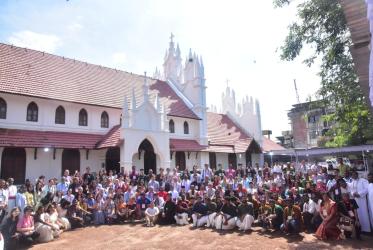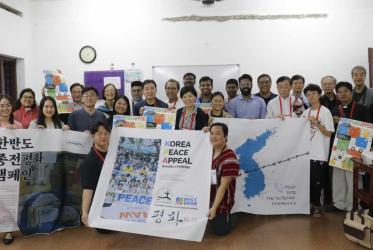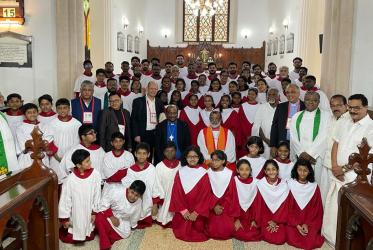Letter to the National Council of Churches and WCC member churches in the Philippines, January 2001.
Dear Sisters and Brothers in Christ,
The World Council of Churches has followed with deep concern the developments in the Philippines particularly since I visited you last March. At that time I witnessed and heard testimonies of general discontent because of the ineptitude and corruption that characterized the rule of President Estrada and his unfortunate response to events unfolding in the Southern Philippines at that time.
Our concern is consistent with our long history of involvement in the struggle of the Filipino people for justice, peace and democracy. A WCC-CCA delegation was there after the Velvet Revolution' that overthrew the dictatorship of Ferdinand Marcos to accompany the Churches in the Philippines and to commend them on the role they played in the struggle against the injustices and human rights violations of that military dictatorship. The delegation paid a courtesy call on former president Corazon Aquino on her assumption of office.
There was much promise of political and economic reforms and a period of relative calm under the democratically-elected governments of Presidents Aquino and Fidel Ramos. However, conflict and corruption continued to afflict Philippines society. Despite its promises the government consistently failed to address the underlying causes of discontent and conflict. President Fidel Ramos entered into peace negotiations with the Moro Islamic Liberation Front and the National Democratic Front, but these initiatives were never sincerely followed through. As a result, the situation in the Southern Philippines and the rural areas deteriorated dramatically as fighting once again broke out early last year between the armed forces of the Philippines and the fighters of MILF. Unfortunately the Estrada government's response was to embark on military operations, remilitarising the rural areas by sending a large number of armed forces personnel there. This led to massive displacement and human rights violations.
It is ironic that while large numbers of Filipino people toil abroad in distant lands to sustain their families and provide the much needed foreign exchange to the country, the ruling elites have been oblivious of their sacrifices and continue with impunity to indulge in waste, corruption and abuse of power. It is time that measures be taken to bring an end to this system that has perpetuated disparities, social contradictions and injustice in Philippines society. The impeachment proceedings against President Estrada that ended without a verdict revealed again the inadequacies of the present political system. Despite evidence of corruption and public outrage the President defiantly held onto office at great cost to the country's economy.
We commend the churches in the Philippines for standing once again by the people in that critical hour. Let us hope that this time around, the response to the massively expressed will of the people will lead to thoroughgoing reforms in the political system to make it democratic not only in form but truly participatory and dedicated to the principles of justice, transparency and accountability.
In this Kairos we thank God for the unfailing witness of Christians in the Philippines and of their churches to justice and basic human rights for all. You can be assured of our continuing solidarity, prayers and support in your struggle for justice and righteousness. May God almighty strengthen you and the people of the Philippines as you embark anew on the road to building and revitalising society.
Yours in Christ,
Konrad Raiser
General Secretary





